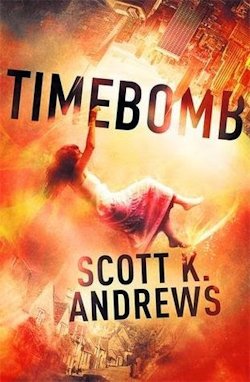Three teens from three times run rampant in 17th century Cornwall in the frenetic first volume of Scott K. Andrews’ TimeBomb trilogy, a paradoxical romp which, whilst engaging and entertaining, promises a little more than it delivers.
To wit, TimeBomb begins quite brilliantly, with a fleeting glimpse of future New York: a sprawling city in which forty-storey superstructures are “dwarfed by the looming organic skytowns that twined sinuously up into the cloud base.” Here, we meet Yojana Patel, the determinedly independent daughter of… a powerful politician, I think? We can’t be certain because Andrews doesn’t dally. In a matter of moments, rather than give her pursuers the satisfaction of catching her, Jana has thrown herself off the roof of a great skyscraper.
Death, in her day, is merely an inconvenience—she has a state-of-the-art board embedded in her head to that exact effect—but this particular passing doesn’t happen as planned. Jana, in fact, never lands.
Instead, a second or two into her fall, she felt a tug upwards. Her first thought was that it was a freak gust of wind momentarily slowing her descent, but the tug increased. It felt as if the gravity that pulled her down was fighting an opposite force that wanted to pull her skywards.
She opened her eyes and gasped. She was hovering in mid-air, surrounded by a halo of coruscating bright red sparks, like some kind of human firework. […] Jana was so surprised by this that it took her a moment to realise that the world around her was darkening, as if a huge cloud was blocking out the sun.
In short, she goes into freefall—through time as opposed to space—before awakening, shaken, in the present day. Here, Jana joins forces with runaway called Kaz, who has been drawn almost inexorably towards Sweetclover Hall. As has Dora Predennick, a quiet Cornish lass from the past who, “in spite of all her natural meekness, humility and stay-at-home unadventurousness […] was very formidable indeed when she was angry.” And having been forcibly transported over a time bridge, as she sees it, Dora’s… pretty pissed.
TimeBomb’s protagonists are a likeable lot, in all, largely because before long, they’re enjoying themselves awfully—and we are as well. The pace of the whole is so headlong we can hardly help it, as Jana jokes:
“I woke up this morning and the most exciting thing I could think of to do was give my bodyguards the slip and play hooky from school. Now I’m hundreds of years in the past, disguising myself so I can go mingle with soldiers and peasants as I make my way to a fortified manor house in search of a woman from the future who wants to kill me. Call me insane, but it sure beats hanging out at the mall.”
With these three—Dora and Kaz and Jana—what you see is what you get, essentially: a lack of contrivance that proves reasonably appealing in Andrews’ hands. That said, he only really gets around to developing Dora, and I’d have preferred to see her partners in time affected by the tale TimeBomb tells as well.
More damning, to my mind, is that fact that Andrews adopts the same perfunctory approach towards the chronological conveyance at the text’s centre:
“Look, there’ll be time for a full explanation later but basically, you two can travel in time. Dora too. There’s a reason for that, but it’s complicated and not terribly important right now. What is important right now is that there are people who want to capture you because of things you haven’t done yet. They want to stop you doing them, to change their history and your futures.”
Andrews, alas, clearly cares more about speed than he does detail. Non-stop story beats take precedence over the people of the piece. To the aforementioned author’s credit, his creations have plenty of potential—even the villain, Quil, comes with credibility built in. As she says to Jana, her actions “are not dictated by what you have done, but by what you will do, you and your two friends. But perhaps the future—your future—is not set in stone. I’d like to try and prevent us becoming enemies at all.” Nice of her, right? But no. She goes from relatively reasonable to COMPLETELY EVIL in a single scene, all because the story says so.
Ultimately, TimeBomb is a bit of fun, and that’s fine. Approach it expecting something special and I dare say you’ll be disappointed, but who goes to McDonalds to eat a gourmet meal? This, then, is fast food sci-fi, and who among us doesn’t delight in a supersized order of fries from time to time?
TimeBomb is available now from Hodder & Stoughton.
Niall Alexander is an extra-curricular English teacher who reads and writes about all things weird and wonderful for The Speculative Scotsman, Strange Horizons, and Tor.com. He’s been known to tweet, twoo.










